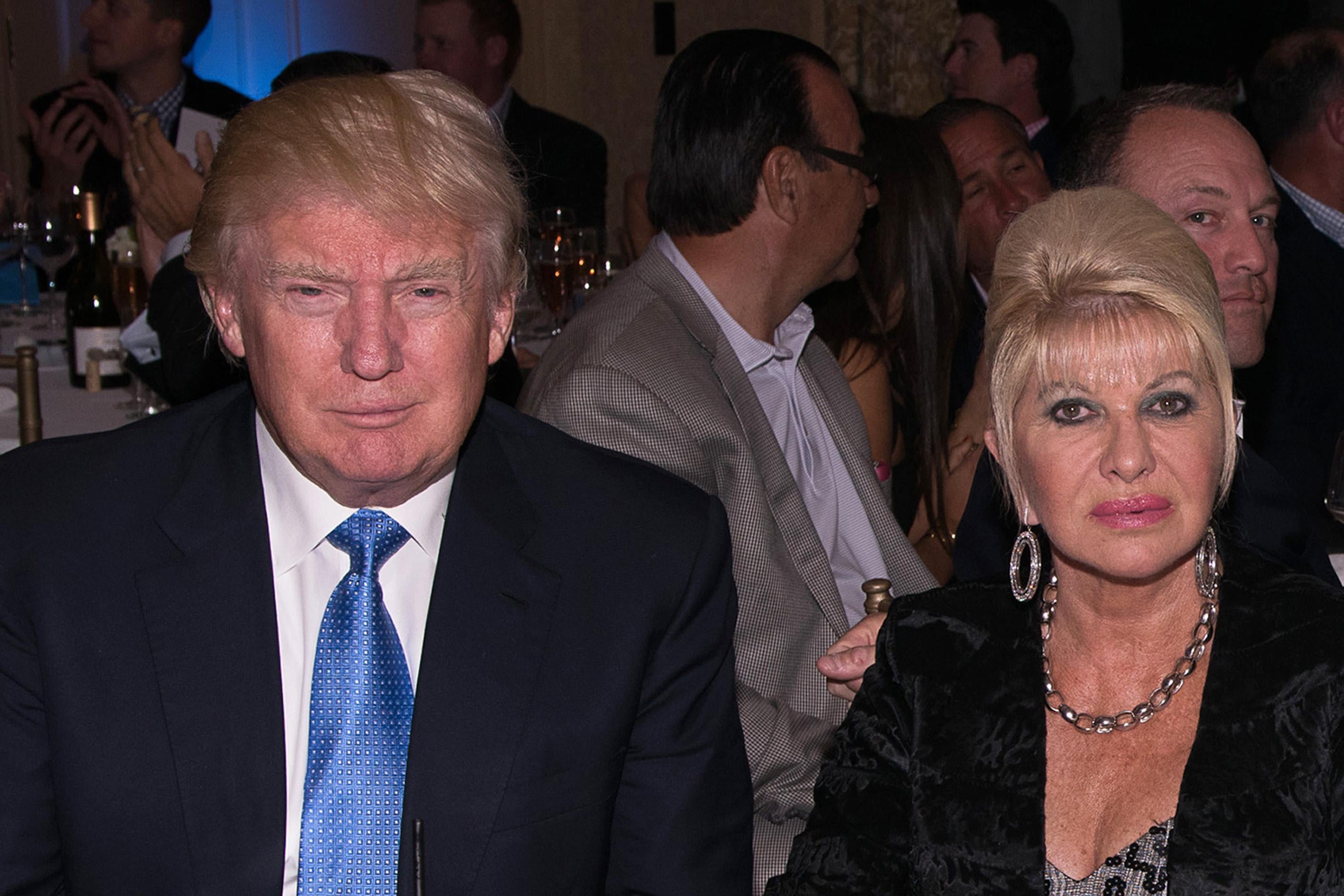When the news broke in 1990 that one of New York’s premier 1980s power couples had called it quits, Ivana Trump—the first wife of a man known as “the Donald,” a phrase she allegedly coined—was clearly not going to split from the real estate personality amicably.
She had been wronged: The affair her husband had had publicly was treated like a tantalizing, snicker-worthy scandal, and she was ready to fight tooth and nail for far more money than was afforded in her nuptial agreement.
The fallout was real. Where Trump had once allegedly called his first wife “my twin as a woman,” he went on to disparage her, comparing her to another woman he called a “truly evil human being.” But later in life, and well into Trump’s tenure as president, Ivana defended her former husband and often praised him. (She also appeared in a Pizza Hut ad with him.)
In a 2018 interview she did with the New York Times—on the occasion of becoming a spokesperson for a 45-day luxury meal kit called the Italiano Diet—she praised a meeting he had had with North Korea’s Kim Jong-un in Singapore. “He did great,” she said.
When the Access Hollywood tape that showed Trump bragging about groping women leaked in 2016, she responded, “He just jokes.” And somehow, she was still able to praise him as a father, calling him “loving” and a “good provider,” even though each kid would have to be about 18, she said, before “he could communicate with them.”
This was the great mystery of Ivana, who died this week after a fall at 73 in her home in Manhattan: She didn’t seem to hate her ex-husband. And she—along with so many of us—had every reason to really loathe him.
For starters, Ivana was, by all accounts, greatly responsible for helping Trump build his real estate brand, starting shortly after the two got married in 1977. She managed the Plaza Hotel, she oversaw development of Trump Tower in Manhattan, she raised all three of the kids, Donald Jr., Eric, and Ivanka. She was then subjected to a very public divorce, driven by Trump’s affair with Marla Maples, who he later married. Trump called tabloids himself to talk about the affair, and invited both his wife and mistress to Aspen, causing a fight between him and Ivana that magazine editor Graydon Carter grotesquely described to the Chicago Tribune as “like two bag people fighting on the subway.” (The same article carried the ignominious line: “Did you hear the one about Donald Trump? He just bounced his first Czech.”)
In a divorce deposition, Ivana accused Trump of raping her, though later she said that she had not meant that in a literal sense. This specific detail, much discussed in the 2016 campaign, helped explain why so many people projected their feelings onto Ivana, and why they were so often disappointed: Plenty of Americans wanted to feel for her because she was abused (allegedly physically, but also mentally and emotionally)—and some certainly held out hope she would become a resistance figure, ascending to the person she appeared to be in a cameo in The First Wives Club in 1996. But she never fully landed that role. Instead, she defended Trump, remained his friend, and didn’t seem at all disturbed by the politician he became.
Enough about him, though. Let’s talk about her.
Ivana Zelnickova was born in Czechoslovakia on Feb. 20, 1949. She was a great skier, competing with the Czech junior national team; she was also briefly married to an Austrian ski instructor named Alfred Winklmayr. She called that a “Cold War marriage,” and asserted that the two never lived together. She did get an Austrian passport out of it, though.
She met a 29-year-old Donald Trump while working at a reception in New York. The two married nine months later and quickly got to work on fixing up the Commodore Hotel. She was studying for her interior design license at the time, and took over that part of the work, making a big push for the gaudy, baroque opulence that came to define the era and become the couple’s calling card.
The rest is history, sort of.
After her divorce, Ivana wrote several books, including The Best Is Yet to Come: Coping with Divorce and Enjoying Life Again and a parenting memoir called Raising Trump. (Writing in Slate, Ruth Graham called that book “an effective reminder that once upon a time, when nothing was at stake, the Trumps’ collective atrociousness was merely fun.”) She hosted a TV special, broadcast on Oxygen in 2006, called Ivana Young Man, where she helped another wealthy divorcee find a younger man. She developed her own clothing, fashion, and beauty products, which were sold on QVC London and the Home Shopping Network. She wrote advice columns for the tabloid Globe, as well as for divorcemag.com. She became a brand promoter for, among other things, the Italiano Diet.
She married two more times. (Her wedding with the Italian actor Rossano Rubicondi in 2008 took place at Mar-a-Lago with Trump in attendance.) She continued to be a mother to three, and a grandmother to 10.
At times, she seemed poised to become a feminist icon: To so many women who watched her rise in the 1980s, Ivana was an entrepreneur who stood out as an outré striver among a crowd of wealthy women defined by their husbands. But as with everything else Trump, she is now a reminder of how a specific brand of avarice and showmanship has upended our politics and lives. As with so many others close to her, when the time came, she bowed to the man who bamboozled her and the country. She took her reasons with her.
